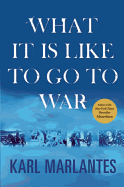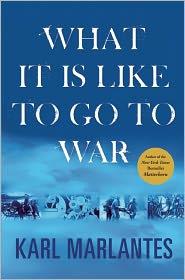

"The Marine Corps taught me how to kill, but it didn't teach me how to deal with killing."Marlantes opens with the idea that the attributes that make late-adolescent males ideal warriors--his choice of the word "warrior" throughout the text deserves an essay of its own--are the very ones that make them ill-equipped for coping with the psychological, emotional and spiritual effects of combat and killing. A former Rhodes Scholar, he draws from his readings in philosophy, psychology, history and mythology to argue that in order to survive battle and return to their civilian lives as whole persons, "warriors have to be able to bring meaning to this chaotic experience."
Homer and Jung stand alongside the Bible and the Bhagavad Gita in a remarkable cadre of source texts that support Marlantes's assertion that military training must expand beyond the mechanics of killing to include dialogue about why we kill in combat and how warriors are likely to feel later about the fact that they have killed. Addressing concerns about warriors' numbness to violence, Marlantes contends that "compassion must be elicited consciously in warfare" and suggests that we incorporate mindfulness training into combat preparations and discourage warriors from depersonalizing the enemy. He emphasizes the necessity (and current dearth) of post-combat rituals to demonstrate respect for the lives taken during battle, and recalls how the men in his unit wept as they obeyed his order to bury an enemy soldier after a particularly brutal encounter. Marlantes also recommends the implementation of mandatory counseling to prevent post-traumatic stress disorder, remove the stigma of needing help and enable veterans to rejoin their communities successfully.
What It Is Like to Go to War can be read as both a letter to young warriors and as a catalyzing call for change. But this is not a book about politics; it is about humanity. Using his own experiences to provide context, Marlantes advances, with startling openness, a revolutionary strategy to preserve the humanity of those who fight for our nation and to honor the humanity of those they kill. --Rebecca Joines Schinsky
Shelf Talker: Matterhorn author Karl Marlantes writes about the necessity of preserving the humanity of those who fight for our nation and honoring the humanity of those they kill, with proposals on how to do so.

